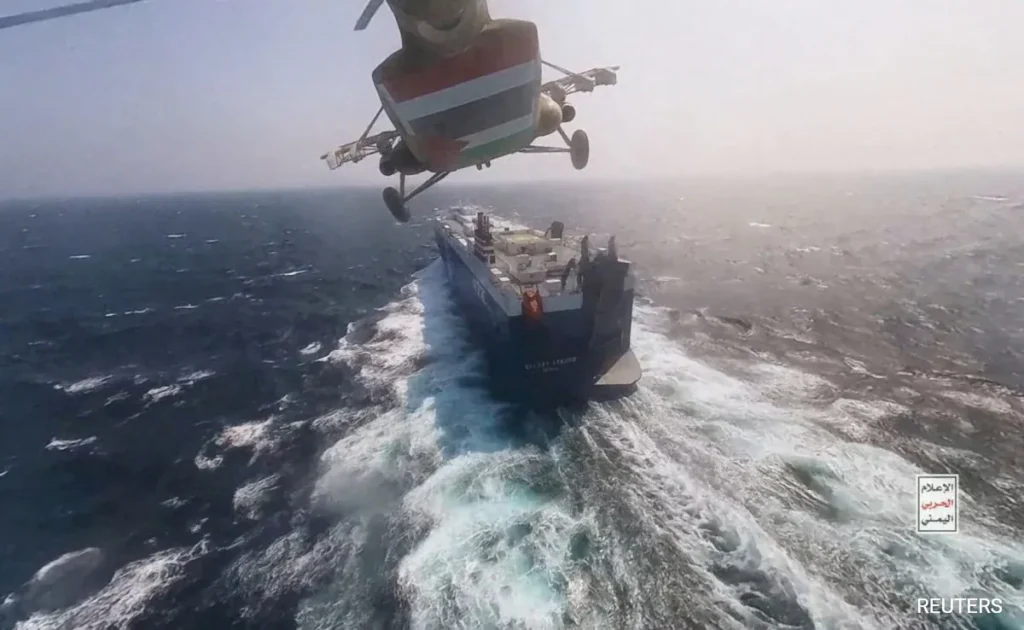The Red Sea crisis has emerged as a significant threat to global trade, with its repercussions expected to manifest in the fiscal year 2025, as per a report released by the Global Trade Research Initiative (GTRI), an esteemed economic think tank.
Originating from Houthi militants’ attacks on civilian-operated cargo ships near the Yemeni coast in October 2023, the crisis has begun to exert its impact across various industries and geographical regions, the report highlighted. Its ramifications on India, in particular, have been pronounced, given the nation’s heavy reliance on the Bab-el-Mandeb Strait for crucial imports of crude oil and liquefied natural gas (LNG), along with its extensive trade ties with key regions.
The report underscored that approximately 65% of India’s $105 billion worth of crude oil imports in FY23, originating from nations such as Iraq and Saudi Arabia, are likely to have traversed through the Suez Canal. Furthermore, concerning overall merchandise trade with Europe and North Africa, nearly 50% of imports and 60% of exports, amounting to $113 billion, may have utilized this vital maritime route. “The crisis has particularly affected routes through the Suez Canal, which handles about 30% of global container trade,” the report elucidated.
As a consequence of ships being compelled to circumvent Africa’s Cape of Good Hope, transit times have been prolonged by approximately 30%, concurrently resulting in a notable 9% reduction in global container shipping capacity, the report delineated. Moreover, the conflict has precipitated a surge in shipping costs by an estimated 40-60%, escalated insurance premiums by 15-20%, triggered delays exceeding 20 days due to rerouting, and elevated the susceptibility to cargo loss stemming from piracy and attacks.
Anticipating continued escalation in shipping and insurance costs, alongside protracted delays in shipment arrivals, the report forewarned of sustained disruptions across global value chains, leading to margin constraints and rendering exports of numerous low-margin products unfeasible from existing locations. Notably, countries across Asia, Africa, and Europe are expected to bear the brunt of these disruptions. “With escalating daily attacks and no end in sight, the Red Sea crisis will adversely impact trade volumes in substantial ways in 2024,” the report emphasized.
Ajay Srivastav, founder of GTRI, elucidated on the specific industries adversely affected by the crisis. He remarked, “Confectionery companies have been hit by high cocoa prices and shortages due to late deliveries from Africa, which have reduced their profits. The textile and leather industries, which operate on thin margins, are renegotiating shipping costs with buyers, impacting earnings. Car manufacturers are using different shipping routes to avoid delays.”
Highlighting the impact on trade routes, the International Monetary Fund (IMF) reported a stark 50% year-on-year decline in trade volume passing through the Suez Canal in the initial two months of the year. Conversely, trade around the Cape of Good Hope witnessed a substantial surge of approximately 74% from the preceding year, indicating a notable shift in trade patterns.
In response to the crisis, the GTRI report emphasized the imperative for comprehensive international collaboration. It advocated for the exploration of alternative maritime and land-based trade routes, notably citing the India-Middle East-Europe Economic Corridor (IMEC) as a pivotal endeavor. The IMEC project seeks to establish an expansive economic corridor linking Europe, the Middle East, and Asia through enhanced transportation, communication networks, and energy infrastructure, encompassing rail, road, and sea routes across two main corridors – the East Corridor and the Northern Corridor.
